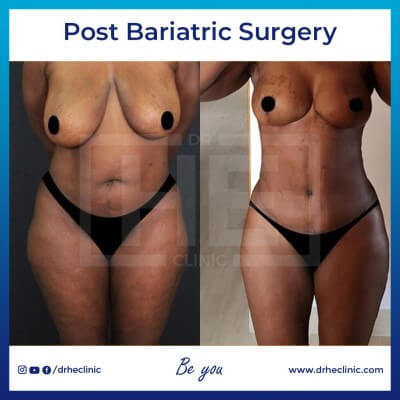Post Bariatric Surgery in Turkey
Post-bariatric surgery in Turkey involves procedures to remove excess skin and reshape the body after significant weight loss. Turkey is known for high-quality medical care at affordable prices, with experienced surgeons performing procedures like tummy tucks, arm lifts, and thigh lifts. Comprehensive care packages include pre-operative consultations, the surgery itself, and post-operative follow-up.

Post Bariatric Surgery in Turkey: A Comprehensive Overview
Post bariatric surgery care in Turkey begins with a thorough consultation and medical evaluation to ensure the patient’s readiness for the procedure. The surgery is performed using advanced techniques in modern, high-tech facilities by highly skilled surgeons.
After the surgery, a comprehensive post-operative care plan is essential for successful recovery and long-term weight management. This plan includes regular follow-up visits, nutritional guidance, and personalized exercise regimens. Patients are closely monitored to manage any potential complications and to ensure optimal health outcomes.
Post Bariatric Surgery Steps
1. Initial Consultation
- Assessment: A plastic surgeon evaluates your health, examines the areas of concern, and discusses your goals.
- Discussion: You’ll talk about options for body contouring and the surgeon might suggest procedures that best fit your needs.
- Planning: The surgeon outlines the steps, risks, benefits, and recovery expectations for the recommended surgeries.
2. Pre-Operative Preparation
- Medical Evaluation: Pre-surgery tests to ensure you’re healthy enough for surgery.
- Nutrition and Lifestyle: Guidance on diet and lifestyle to maintain stable weight and optimize healing.
- Medications: Instructions on taking or avoiding certain medications and supplements before surgery.
3. The Surgery
- Procedures can vary widely in scope and may include tummy tuck, body lift, breast lift, arm lift, thigh lift, etc., based on the individual’s needs.
- Anesthesia: Most post-bariatric surgeries are performed under general anesthesia.
- Operation: The specifics of the operation will depend on the procedures being performed, which could range from 2 to 6 hours or more for complex, multiple procedures.
4. Recovery
- Immediate Post-Op: Recovery begins in the hospital or surgical center, where you may need to stay for a few days.
- Home Recovery: Instructions will include care for incisions, signs of complications, activity restrictions, and the use of compression garments.
- Follow-Up Visits: These are crucial for monitoring your healing and progress.
5. Long-Term Care
- Scar Care: Guidance on how to care for scars to ensure they heal well.
- Lifestyle: Continued emphasis on a healthy lifestyle to maintain the results of your surgery.
- Emotional Support: Adjusting to body changes can be emotionally challenging, and support from professionals or groups may be recommended.
6. Additional Procedures
- In some cases, further surgeries may be planned in stages, depending on the extent of skin excess and the individual’s overall health and goals.
Plan Your Trip to Turkey for Post-Bariatric Surgery
| Timeline | Activity | Recommendations |
|---|---|---|
| 6-12 Months Before | Initial Consultation | Consult with your local doctor and a Turkish clinic remotely to discuss eligibility and potential dates. |
| 3-6 Months Before | Medical Preparation | Begin necessary dietary and medical preparations as advised by the surgical team. |
| 1 Month Before | Travel Arrangements | Book flights and accommodation. Arrange for medical visas if necessary. |
| 2 Weeks Before | Final Checks | Finalize all personal and medical preparations. Confirm travel itinerary and local transport in Turkey. |
| Arrival in Turkey | Pre-Op Consultation | Meet with your surgical team in Turkey for a final pre-operative consultation. Undergo any last-minute tests. |
| Day of Surgery | Surgery | Proceed with the post-bariatric surgery as scheduled. |
| 1-2 Weeks Post-Surgery | Recovery in Turkey | Stay in Turkey for initial recovery and follow-up appointments. Follow all post-operative care guidelines. |
| Return Home | Post-Surgery Follow-up | Continue recovery at home with regular follow-ups remotely or with local healthcare providers. |

Need Help? Contact Us!
7/24 Obesity Help Desk
Post Bariatric Surgery Turkey Cost 2025
The cost of post-bariatric surgery in Turkey can vary widely depending on the specific procedures and the complexity of the case. On average, procedures can range from $4,800 to $5,800 or more for surgeries like body lifts, arm lifts, thigh lifts, breast lifts, tummy tucks, facelifts, eyelid surgery, and rhinoplasty.
These costs reflect Turkey’s position as a more affordable destination for medical tourism compared to many Western countries, due to factors such as lower cost of living, favorable currency exchange rates, and competitive pricing among clinics.
| Region | Average Post Bariatric Surgery Cost |
 Turkey Turkey | $4,800 – $5,800 or more |
 USA USA | $8,000 – $12,000 or more |
 Canada Canada | $8,000 – $12,000 or more |
 UK UK | £5,000 – £8,000 or more |
 Australia Australia | AUD 8,000 – AUD 15,000 or more |
 Germany Germany | €8,000 – €10,000 or more |
 France France | €7,000 – €10,000 or more |
Why does Post Bariatric Surgery Cost in Turkey Cheap?
- Exchange rate: Favorable exchange rates for foreign currencies relative to the Turkish lira can make procedures even cheaper for international patients.
- Standardized procedures: Many Turkish clinics employ standardized protocols and techniques for common procedures like Post Bariatric Surgery, achieving efficiency and cost savings.
How to Reach Turkey?
By Air: Turkey is well-connected with direct flights from major cities around the world. There are international airports in Istanbul, Ankara, Antalya, and Izmir, among others. You can check for flights from your nearest major airport to one of these Turkish cities.
By Sea: Turkey has several ports that receive passenger ferries from neighboring countries and islands. You can travel to Turkey by ferry from Greece, Russia, Ukraine, and other nearby locations. Major ports include Istanbul, Izmir, and Antalya.
By Train: While not as common as air or sea travel, you can also reach Turkey by train from select European cities. The most common routes are from Sofia, Bulgaria, and Bucharest, Romania, to Istanbul. However, train travel to Turkey may require multiple transfers and take longer compared to air or sea travel.
| Departure City | Arrival City | Duration | Estimated Price |
|---|---|---|---|
| 🛫 London (LHR) | 🛬 Istanbul (IST) | ⏰ 3 hours 50 minutes | 💰 $300 |
| 🛫 Manchester (MAN) | 🛬 Istanbul (IST) | ⏰ 4 hours 35 minutes | 💰 $350 |
| 🛫 Paris (CDG) | 🛬 Istanbul (IST) | ⏰ 3 hours 25 minutes | 💰 $280 |
| 🛫 Frankfurt (FRA) | 🛬 Istanbul (IST) | ⏰ 2 hours 55 minutes | 💰 $320 |
| 🛫 Moscow (VKO) | 🛬 Istanbul (IST) | ⏰ 4 hours 25 minutes | 💰 $400 |

Post Bariatric Surgery Before and After Photos
Submit your request for access to before and after photos to see actual patient results from our many cosmetic procedures and treatments at Dr. HE Clinic.
Post Bariatric Surgery Turkey Reviews


Posted on
Truspilot
Posted on
TruspilotIs it Safe To Have A Post Bariatric Surgery in Turkey?
Yes, it is generally safe to have post-bariatric surgery in Turkey. The country is known for its high medical standards, experienced surgeons, and advanced facilities. However, it’s crucial to thoroughly research and choose a reputable clinic and certified surgeon to ensure safety and optimal results.
Frequently Asked Questions About Post Bariatric Surgery
Is Post Bariatric Surgery Painful?
Post-bariatric surgery involves some pain and discomfort, which can be managed with prescribed pain medication. Most patients find that the pain decreases significantly within a few days to weeks.
Does Health Insurance Pay for the Post Bariatric?
Health insurance may cover post-bariatric surgery if it is deemed medically necessary to address issues such as excess skin causing rashes or infections. Coverage varies by policy and provider, so it’s essential to check with your insurance company.
How Long Does a Post Bariatric Take in Turkey?
Post-bariatric surgery in Turkey typically takes 3 to 6 hours, depending on the complexity and number of procedures performed. Recovery time varies, with initial recovery in Turkey usually lasting 1 to 2 weeks, followed by additional recovery at home.
When Can I Return to My Daily Life after Post Bariatric in Turkey?
You can usually return to your daily life 4 to 6 weeks after post-bariatric surgery in Turkey. However, light activities can often be resumed within 1 to 2 weeks, depending on your surgeon’s advice and your individual recovery progress.
What are the Advantages of Post Bariatric in Turkey?
The advantages of post-bariatric surgery in Turkey include high-quality care, experienced surgeons, affordable prices, and comprehensive care packages. Additionally, patients can enjoy a comfortable recovery in Turkey’s beautiful and culturally rich environment.
QUALITY CERTIFICATES
















Posted on
Truspilot